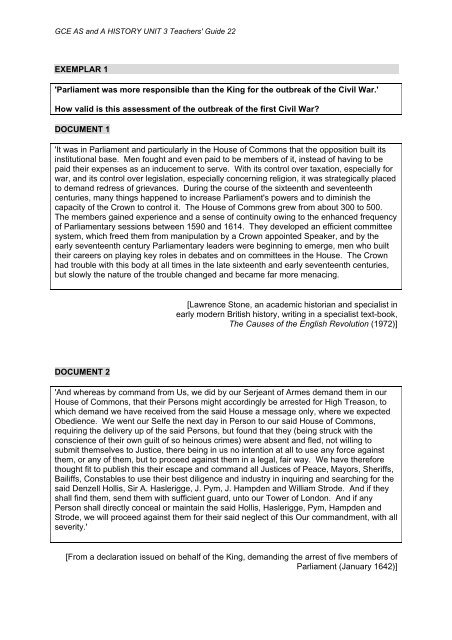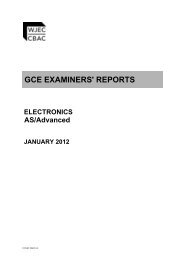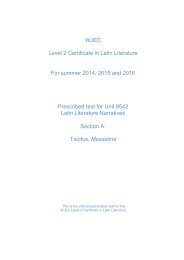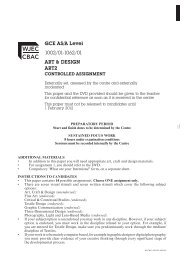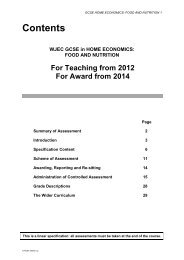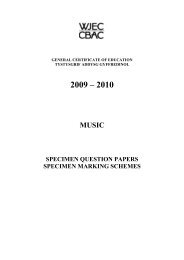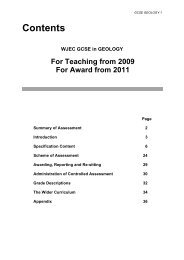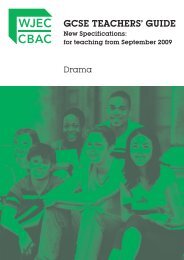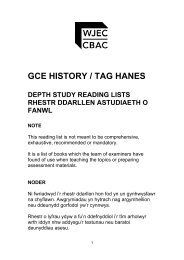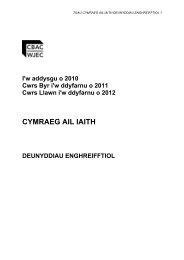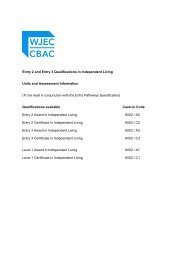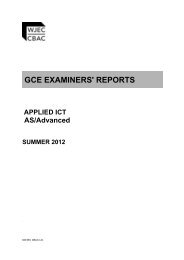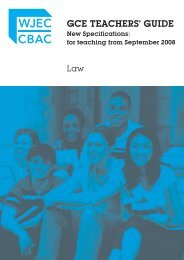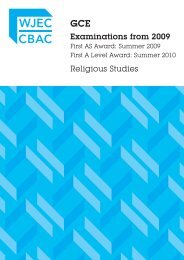GCE History Teachers' Guide - Unit 3 - WJEC
GCE History Teachers' Guide - Unit 3 - WJEC
GCE History Teachers' Guide - Unit 3 - WJEC
Create successful ePaper yourself
Turn your PDF publications into a flip-book with our unique Google optimized e-Paper software.
<strong>GCE</strong> AS and A HISTORY UNIT 3 <strong>Teachers'</strong> <strong>Guide</strong> 22<br />
EXEMPLAR 1<br />
'Parliament was more responsible than the King for the outbreak of the Civil War.'<br />
How valid is this assessment of the outbreak of the first Civil War?<br />
DOCUMENT 1<br />
'It was in Parliament and particularly in the House of Commons that the opposition built its<br />
institutional base. Men fought and even paid to be members of it, instead of having to be<br />
paid their expenses as an inducement to serve. With its control over taxation, especially for<br />
war, and its control over legislation, especially concerning religion, it was strategically placed<br />
to demand redress of grievances. During the course of the sixteenth and seventeenth<br />
centuries, many things happened to increase Parliament's powers and to diminish the<br />
capacity of the Crown to control it. The House of Commons grew from about 300 to 500.<br />
The members gained experience and a sense of continuity owing to the enhanced frequency<br />
of Parliamentary sessions between 1590 and 1614. They developed an efficient committee<br />
system, which freed them from manipulation by a Crown appointed Speaker, and by the<br />
early seventeenth century Parliamentary leaders were beginning to emerge, men who built<br />
their careers on playing key roles in debates and on committees in the House. The Crown<br />
had trouble with this body at all times in the late sixteenth and early seventeenth centuries,<br />
but slowly the nature of the trouble changed and became far more menacing.<br />
DOCUMENT 2<br />
[Lawrence Stone, an academic historian and specialist in<br />
early modern British history, writing in a specialist text-book,<br />
The Causes of the English Revolution (1972)]<br />
'And whereas by command from Us, we did by our Serjeant of Armes demand them in our<br />
House of Commons, that their Persons might accordingly be arrested for High Treason, to<br />
which demand we have received from the said House a message only, where we expected<br />
Obedience. We went our Selfe the next day in Person to our said House of Commons,<br />
requiring the delivery up of the said Persons, but found that they (being struck with the<br />
conscience of their own guilt of so heinous crimes) were absent and fled, not willing to<br />
submit themselves to Justice, there being in us no intention at all to use any force against<br />
them, or any of them, but to proceed against them in a legal, fair way. We have therefore<br />
thought fit to publish this their escape and command all Justices of Peace, Mayors, Sheriffs,<br />
Bailiffs, Constables to use their best diligence and industry in inquiring and searching for the<br />
said Denzell Hollis, Sir A. Haslerigge, J. Pym, J. Hampden and William Strode. And if they<br />
shall find them, send them with sufficient guard, unto our Tower of London. And if any<br />
Person shall directly conceal or maintain the said Hollis, Haslerigge, Pym, Hampden and<br />
Strode, we will proceed against them for their said neglect of this Our commandment, with all<br />
severity.'<br />
[From a declaration issued on behalf of the King, demanding the arrest of five members of<br />
Parliament (January 1642)]


